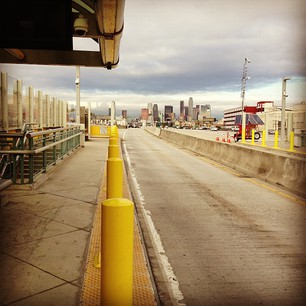Metro Fare Change Could Hurt Some, Help Others

One proposal would increase standard fares from the current $1.50 to $1.75 by 2015, and $2.00 by 2018; day passes would increase from the current $5.00 rate to $7.00 and eventually $8.00.
Another proposal recommends that metro maintains standard fares for weekends, holidays and non-peak times during the week, while raising the fare to $2.25 on weekday mornings until 9 am and from 3:00 pm to 7:00 pm; day passes would jump to $9.00 by 2015.
Both new fare proposals would include free transfers within 90 minutes of the initial ride—the lack of which is one of the most disliked elements of the current metro fare policy.
The current fare system penalizes riders who have to transfer to reach their destination, forcing them to pay twice. If you’re getting on the train at Pico station, the 1-mile ride to Pershing Square costs $3.00, but the trip all the way to Long Beach will only set you back $1.50.
Metro’s potential new fare plan would resolve such discrepancies.
READ MORE: Metro Red And Purple Lines To Have Wifi By 2016
Paradoxically, the fare hike may actually see their transportation expenses go down for those who make transfers.
"Under the proposed fare system, a rider could ride from home to the supermarket and back for just a single fare — as long as they board their last bus or train within 90 minutes of starting their trip," according to Metro spokesman Steve Hymon.
Some riders believe that the 90-minute timeframe is too short, however.
"Personally when I take the metro, I travel pretty far, and I have to make four transfers in one trip," said Christion Cortez. "It takes two hours."
READ MORE: Public Transit Can't Dent Century City Traffic
Free transfers could also encourage more people to ride the Metro.
In July 1997, New York City introduced free transfers. Riders found it much more convenient and flexible to take a second bus, even when they didn’t plan to, and by the end of the year, bus ridership had risen by 18%.
However, an important distinction is that when New York implemented free transfers, it did not raise fares at the same time, which can repel riders. Research suggests that for every 3 percent increase in transit fares, ridership drops about 1 percent.
One rider on Western Avenue, Steve McNair, said that a fare increase would be acceptable as long as increased revenues lead to improvements in service.
Bart Reed, Executive Director of the Transit Coalition, an organization that advocates for better public transit in Southern California, believes that fare increases are important to maintaining good bus and train service.
"Unfortunately, we don't adjust the price for services whose expenses are increasing," said Reed. "It's a lot easier politically to reduce bus service."
The proposed fares are unsurprising considering similar changes elsewhere.
"In other cities they're already charging $2.25, $2.50," explained Reed. "In 2015 they might be charging $3.00 a ride. I don't think there's any problem with incrementally going up."
Contact Staff Reporter Axel Hellman here.



